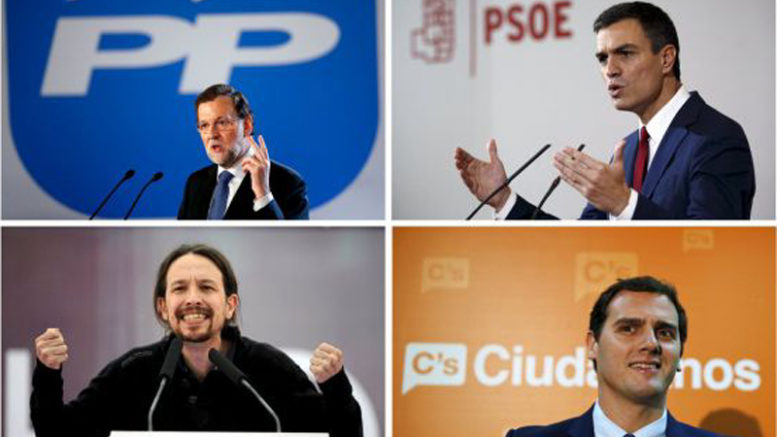• PP & Unidos Podemos tactics shift campaign debate to political extremes
• Eroded centrist vote forebodes tough negotiations, possible third election
Demographic analyses of voter preferences leading up to Sunday’s general election and campaign statements by party leaders pointing to difficulties in negotiating post-election governing pacts have led opinion polling experts and election observers to project another deadlocked parliament, with some even pointing to the likelihood of a third general election — something Spanish democracy has not experienced since the early 1920s.
Opinion poll experts from Sigma Dos, Metroscopia and Euskobarómetro surveyed by the daily El Mundo newspaper say that thanks to a generational voter shift and to the strategies of the left-wing Unidos Podemos coalition and the right-wing Partido Popular (PP), voter preferences in the 26th June general election campaign have become very polarized. With the vast majority of Spain’s voters under age 35 having rejected the legacy PP and Socialist party (PSOE) and shifted their loyalties to the new parties Ciudadanos and Podemos (We Can), the latter (running in coalition as Unidos Podemos on Sunday) has been most able to capitalize on that demographic shift – the number of under-35 Unidos Podemos voters is now said to be triple that of the PP and PSOE combined.
The pollsters also say that the ideological center of the political debate has given way to the extremes, with the PP and the Socialists only able to retain the complete loyalty of their most devoted followers, their “true believer” generation of voters now aged 55 and above and approaching or already into retirement. The polls now indicate the PP vote share may have hit a ceiling, with analysts saying the loyalty of Socialist voters is less firm, in part because the electorate remains apparently unconvinced of the value of the PSOE’s tactical move to the center and its unsuccessful coalition attempt with centre-right Ciudadanos in the aftermath of the indecisive 20th December general elections.
Analysts surveyed by daily newspaper El Pais say a high-rate of abstentionism on Sunday would further negatively impact the centrist vote overall. While regionally the PSOE is expected to remain strong in the south of the country, the PP is seen picking up votes in the rural center of Spain, with Unidos Podemos doing well in Madrid and in the strongly regionalist areas where it has campaigned in coalition with local movements, including Galicia, Catalonia, the Canary Islands and the Basque Country.
All analysts surveyed say the polls clearly indicate Unidos Podemos is solidifying its lead over the PSOE and will win the second greatest number of votes on Sunday, though because of Spain’s skewed election laws favoring incumbent parties the Socialists may yet retain more seats than Podemos in Congress. That outcome could leave the PSOE in a strengthened position to reach a negotiated outcome and strike a governing coalition deal after the election, but analysts caution that just as likely may be another stalemate in post-election negotiations and a return for Spanish voters to the ballot box for a third-round general election later in the year.
► Read More in Spanish at El País and El Mundo …


